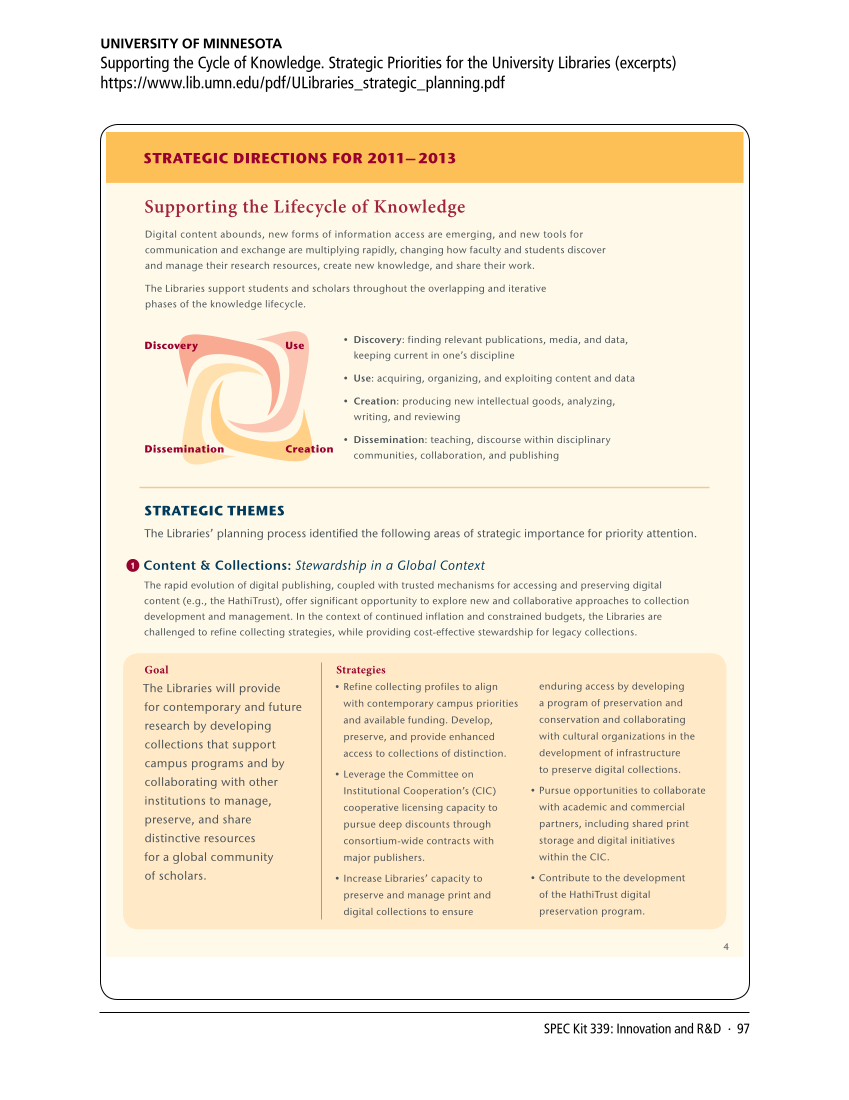SPEC Kit 339: Innovation and R&D · 97
UNIVERSITY OF MINNESOTA
Supporting the Cycle of Knowledge. Strategic Priorities for the University Libraries (excerpts)
https://www.lib.umn.edu/pdf/ULibraries_strategic_planning.pdf
STRATEGIC DIRECTIONS FOR 2011– 2013
STRATEGIC THEMES
The Libraries’ planning process identified the following areas of strategic importance for priority attention.
Strategies
• Refine collecting profiles to align
with contemporary campus priorities
and available funding. Develop,
preserve, and provide enhanced
access to collections of distinction.
• Leverage the Committee on
Institutional Cooperation’s (CIC)
cooperative licensing capacity to
pursue deep discounts through
consortium-wide contracts with
major publishers.
• Increase Libraries’ capacity to
preserve and manage print and
digital collections to ensure
enduring access by developing
a program of preservation and
conservation and collaborating
with cultural organizations in the
development of infrastructure
to preserve digital collections.
• Pursue opportunities to collaborate
with academic and commercial
partners, including shared print
storage and digital initiatives
within the CIC.
• Contribute to the development
of the HathiTrust digital
preservation program.
1 Content &Collections: Stewardship in a Global Context
The rapid evolution of digital publishing, coupled with trusted mechanisms for accessing and preserving digital
content (e.g., the HathiTrust), offer significant opportunity to explore new and collaborative approaches to collection
development and management. In the context of continued inflation and constrained budgets, the Libraries are
challenged to refine collecting strategies, while providing cost-effective stewardship for legacy collections.
Goal
The Libraries will provide
for contemporary and future
research by developing
collections that support
campus programs and by
collaborating with other
institutions to manage,
preserve, and share
distinctive resources
for a global community
of scholars.
Supporting the Lifecycle of Knowledge
Digital content abounds, new forms of information access are emerging, and new tools for
communication and exchange are multiplying rapidly, changing how faculty and students discover
and manage their research resources, create new knowledge, and share their work.
The Libraries support students and scholars throughout the overlapping and iterative
phases of the knowledge lifecycle.
Discovery Use
Dissemination Creation
• Discovery: finding relevant publications, media, and data,
keeping current in one’s discipline
• Use: acquiring, organizing, and exploiting content and data
• Creation: producing new intellectual goods, analyzing,
writing, and reviewing
• Dissemination: teaching, discourse within disciplinary
communities, collaboration, and publishing
4
UNIVERSITY OF MINNESOTA
Supporting the Cycle of Knowledge. Strategic Priorities for the University Libraries (excerpts)
https://www.lib.umn.edu/pdf/ULibraries_strategic_planning.pdf
STRATEGIC DIRECTIONS FOR 2011– 2013
STRATEGIC THEMES
The Libraries’ planning process identified the following areas of strategic importance for priority attention.
Strategies
• Refine collecting profiles to align
with contemporary campus priorities
and available funding. Develop,
preserve, and provide enhanced
access to collections of distinction.
• Leverage the Committee on
Institutional Cooperation’s (CIC)
cooperative licensing capacity to
pursue deep discounts through
consortium-wide contracts with
major publishers.
• Increase Libraries’ capacity to
preserve and manage print and
digital collections to ensure
enduring access by developing
a program of preservation and
conservation and collaborating
with cultural organizations in the
development of infrastructure
to preserve digital collections.
• Pursue opportunities to collaborate
with academic and commercial
partners, including shared print
storage and digital initiatives
within the CIC.
• Contribute to the development
of the HathiTrust digital
preservation program.
1 Content &Collections: Stewardship in a Global Context
The rapid evolution of digital publishing, coupled with trusted mechanisms for accessing and preserving digital
content (e.g., the HathiTrust), offer significant opportunity to explore new and collaborative approaches to collection
development and management. In the context of continued inflation and constrained budgets, the Libraries are
challenged to refine collecting strategies, while providing cost-effective stewardship for legacy collections.
Goal
The Libraries will provide
for contemporary and future
research by developing
collections that support
campus programs and by
collaborating with other
institutions to manage,
preserve, and share
distinctive resources
for a global community
of scholars.
Supporting the Lifecycle of Knowledge
Digital content abounds, new forms of information access are emerging, and new tools for
communication and exchange are multiplying rapidly, changing how faculty and students discover
and manage their research resources, create new knowledge, and share their work.
The Libraries support students and scholars throughout the overlapping and iterative
phases of the knowledge lifecycle.
Discovery Use
Dissemination Creation
• Discovery: finding relevant publications, media, and data,
keeping current in one’s discipline
• Use: acquiring, organizing, and exploiting content and data
• Creation: producing new intellectual goods, analyzing,
writing, and reviewing
• Dissemination: teaching, discourse within disciplinary
communities, collaboration, and publishing
4
































































































































































































